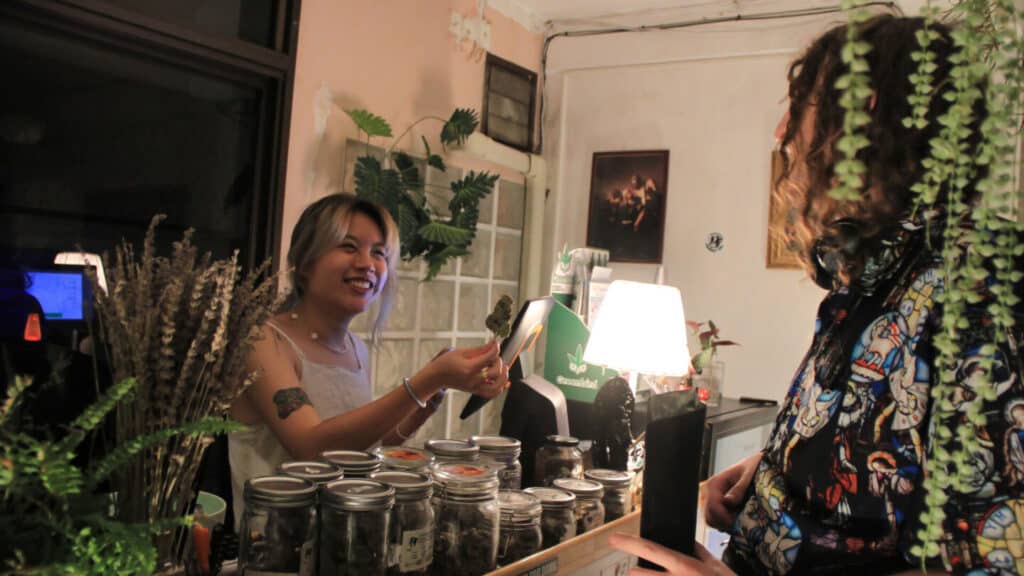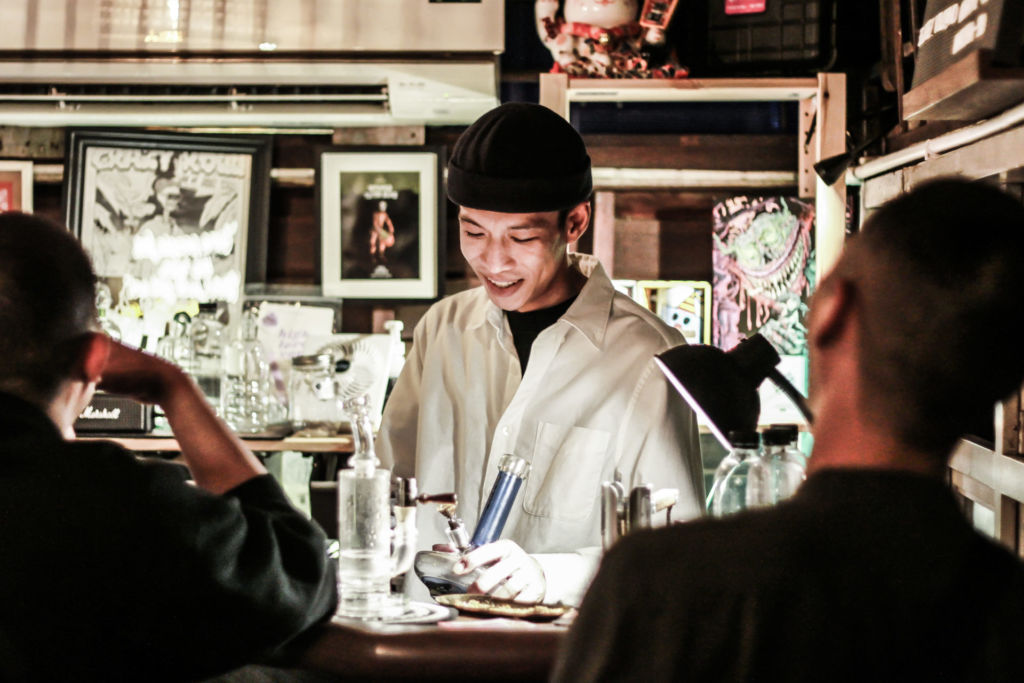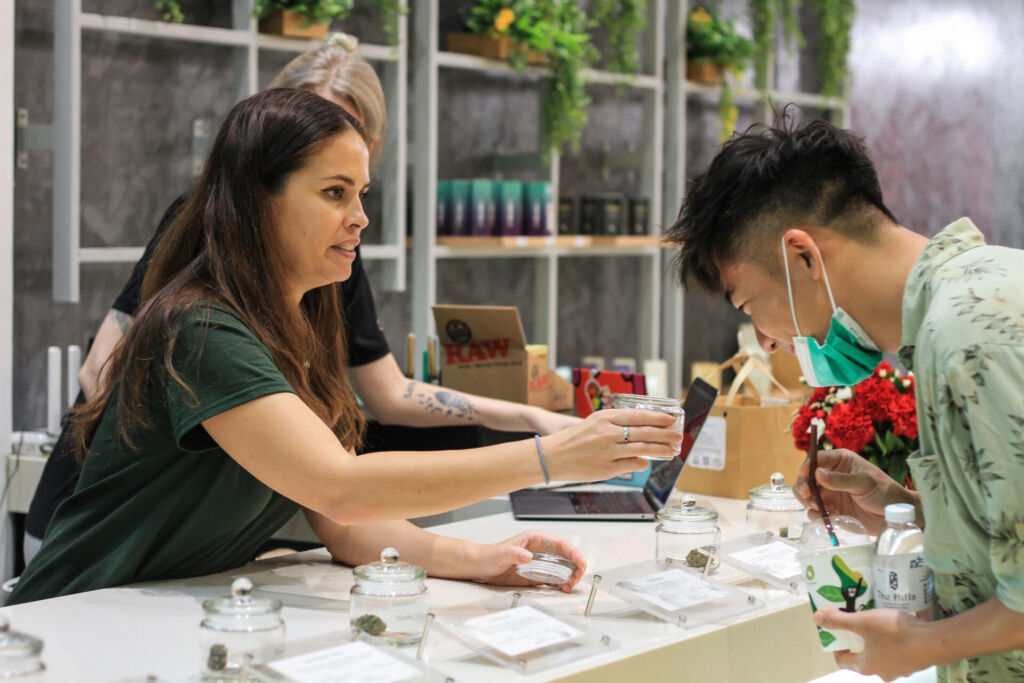- Dispensaries
-
Cultivars
By Cultivar Types
By Effects
By Terpenes
- Blog & Press
- About
- Products
As Bangkok goes to pot, a new career blossoms: the budtender
- Siam Green
- September 2, 2023
- 1:11 pm
- No Comments

It was at the peak of the COVID-19 pandemic that architect Visut Innadda was laid off by his firm along with hundreds of others. He says it was a wake-up call.
“People said that being an office employee is a stable job, but that’s not true,” Visut said. “I was presented with two choices: Find a new job or create something that’d be my own. I chose the latter.”
Months later, when Thailand became the first in Asia to decriminalize cannabis, he seized the opportunity to enter the new industry which had been created overnight.
Visut, who consumed weed back in the underground days, opened a dispensary with several friends in Bangkok’s Silom area, one day after it became legal to buy and sell cannabis. Within a few months, they had three branches.
With storefronts blossoming throughout the city came a sudden need for a specific expertise in both customer service and narcotics: enter the budtender. A portmanteau of “bud” and “bartender,” the budtender has quickly become the nation’s newest career path.
And it is drawing people from all walks of life, whether investors or taco chefs or even weed-loving Bangkok cops. But the majority are likely to have backgrounds in retail and hospitality.

“When weed became legal, I thought ‘Why don’t I find a way to work with it?’” said Kodchakorn Maicramsuk, who used to work in sales for a clothing brand.
“Then, I saw a job posting looking for a budtender. I applied in a heartbeat.”
In September, Kodchakorn entered the new world of cannabis. She found herself standing behind a counter inside a shop located on Bangkok’s Khaosan Road – a backpacker destination that has gone from gauche bazaar to “weed hub.”
“Being a budtender is quite similar to my old job, being a salesperson: communication and hospitality are key,” Kodchakorn said. “But what’s different is that I get to learn about many different weed strains every day and help pick the right ones for customers.”

It’s been nine months since Thailand delisted cannabis from the narcotic list, yet the government still has not passed a much-awaited bill to regulate its use. Amid the regulatory limbo emerged one of the most advanced and fast-growing cannabis industries in the world, with huge economic implications.
The combined market for medical marijuana and hemp in Thailand is expected to expand by about 15% annually through 2025 and be worth THB43 billion (US$1.2 billion) by 2025, according to the University of Thai Chamber of Commerce.
More than 5,000 businesses had been granted licenses to sell weed as of February, according to the Department of Thai Traditional and Alternative Medicine. That means thousands of new jobs in the fields, in offices, and behind the counters at all those dispensaries.

‘We want nerds!’
When legalization was only a few months old, the industry, outlawed for so long, could not wait any longer for direction from the government and began steering its own course.
Some cannabis shops went ahead with education and knowledge sharing events. They began hosting workshops, organizing training, and making their own media.
The industry is too new for there to be any certified training programs or formal education on budtending. Experience and familiarity are still the key traits to entering the workforce. From time to time, some informal training has taken place.
The Dispensary by Taratera began hosting weed workshops where the public could learn about varieties of cannabis. The workshops were led by Visut, who has also trained the 10 budtenders now working for the company.
“It’s not just about getting high only. Knowledge, standards, and cannabis laws have to go hand in hand,” he said.
“I believe in [training] because there are a lot of technicalities to know when it comes to cannabis. There is a health science to it,” said Tian Scherer, the 37-year-old retail operations manager at Siam Green cannabis store on Sukhumvit Road.
Having studied nutrition in college, Tian is a veteran whose budtending career started during California’s medical marijuana days. Enthusiastic about both cannabis and nutrition, she worked as a budtender at Buds & Roses, an award-winning dispensary in Los Angeles, among other jobs.
Just last year, Tian published a book focusing on consuming cannabis for health – without the psychoactive effects.
“My background was nutritional science, so I learned about organic chemistry, biology, and human anatomy,” she said. “So I am able to use that to help my patients better understand how cannabis works with their body.”
“Being a good budtender requires knowledge and interest in the science of it. We want nerds!” Tian said, laughing.

Now in charge of retail, Tian said she wants to develop educational programs to teach staff through videos, assessments, and quizzes.
“And that way we can make sure that, you know, everyone is on the same page,” Scherer said.
Find the right buds
Tending buds is similar to tending a bar: Budtenders work long hours behind a counter and make sure customers are satisfied with the products, which just happen to be weed in this case.
But oftentimes they have to step into another role: pharmacist or therapist.
“Some customers don’t buy weed for recreational smoking, but for medical benefits,” said Nitikrist Attakrist, a former lawyer who opened Shaggy Buds, a weed shop in the Rama IX area.
“They told me they suffered from insomnia or migraine, so my job is to recommend the right buds for them,” Nitikrist said. “That’s why being very knowledgeable about weed strains is important.”
Instead of relying solely on personal experience to sell the products, budtenders should follow the science and a healthy curiosity. They must keep up with new information to understand the herb’s potency.
“It’s not like, ‘Hey bro, this weed is gonna make you high as a kite.’ No, not like that,” Visut said. Instead, he navigates his customers to the right weed based on their lifestyle and desired outcomes.
“If you want to pair weed with working out, I’d recommend one with high THC (Tetrahydrocannabinol) and small amount CBD (Cannabidiol) because this combination helps relax the muscles but you won’t be sleepy.” he explained.
THC is the main psychoactive compound in cannabis that produces the high sensation. CBD, meanwhile, is considered a promising pharmaceutical agent with anti-inflammatory properties used to treat pain and other conditions.
After Visut switched from architect to weed cultivation and retail full time, he said he “wakes up, eats, and sleeps” among cannabis plants at a farm. There, he spends time studying terpenes – organic compounds producing distinctive aromas from “piney” and “earthy” to “peppery” and “citrusy.”

Terpenes are basically scents. But they can hold diverse functions and produce a range of therapeutic and mood-altering effects. Researchers and budtenders have been increasingly looking at terpenes as a way to identify cannabis strains and predict their effects.
That means some budtenders have moved on from talking only about indicas, sativas, and hybrids.
“Those labels are actually antiquated,” Tian said. “I taught my staff that, instead of indica, sativa and hybrid, ask the customers what they wanted.”
Being connoisseurs developing expertise in the use of scent and fragrance, budtenders are also being compared to wine sommeliers.
“You slurp a wine and put your nose in it. It’s kinda like the same with cannabis but with terpenes,” Tian said.

Creating standards, together
There is no doubt that the immediate aftermath of June’s decriminalization was chaos due to confusing information, unclear rules, lax enforcement, and even the government’s own flip-flopping.
Investors hate uncertainty, and weed entrepreneurs were stuck in a new paradigm that was half-baked at best. With the Cannabis Act on ice in parliament, and some members of the opposition vowing to re-criminalize weed, the actual laws and future outlook will remain hazy for a long while. The politics of cannabis have everyone in the industry on their toes, as many are trying to make the election expected in May a referendum on the decriminalization policy of the ruling coalition government.
“Since the laws are still unclear, the tracking and controlling of weed can be difficult to do,” said Wassaya Iemvijan, co-owner of Shaggy Buds.
Wassaya proposed that a seed-to-sale licensing system should be initiated, putting every business involved – from farms and stores to dispensaries – on the record.
“If that can be done, in the end everything will be coordinated. Everything will be traceable and transparent,” she said.

According to Tian, Thailand could learn lessons from the successes and mistakes of other places that have already legalized weed, such as California.
For example, under current California regulations, licenses are handed out based on the size of an operation. While weed growers can only obtain one for medium-sized facilities, there is no limit on the number of small-time licenses they can acquire. That created a legal loophole that allowed larger growers to hoard licenses and operate farms of unlimited sizes.
“I came from California, and it was a total disaster turning recreational,” Tian said. “It was overtaxed, over-regulated. It was starting to be controlled by these big monopolies. That’s something I’d really hate to see here in Thailand.”
Despite the backlash that has threatened to make cannabis illegal again, it’s hard to see a sweeping shutdown of the thousands of dispensaries, which continue to open every day, not only in Bangkok but nationwide.
“As for any local weed shops that just opened, I support them all,” Nitikrist said. “Diversity makes the community beautiful, and it’s necessary to keep it that way.”
With its good rapport and connections with health authorities, the now-world-famous Sukhumweed and friends have already proposed a collaboration between dispensaries and health authorities to efficiently inform the public.
“I asked them why don’t we work together? Doctors have knowledge on medicine; we know best about the consumption,” said Yasmin Pathan, Sukhumweed’s 26-year-old budtender.

Yasmin is also known for her YouTube weed channel Min D Green, where she has vocally promoted cannabis since its outlaw days. Studying journalism in college, Min’s thesis explored cannabis, its history, and beneficial uses.
For her internship, she made three animations about weed for local hospitals in her hometown, Nakhon Si Thammarat, to inform the public about medicinal use of weed.
“If we want to be in this industry for a long term, let’s collaborate and set up standards together,” she said.



